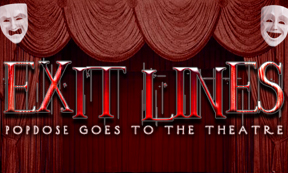 The Broadway year began with a bang–and fireworks, and fisticuffs–as Cate Blanchett made her main stem debut in The Present, a gloss on Anton Chekhov adapted by her husband, Andrew Upton. The good news is, it’s better than the daft Cherry Orchard presented earlier in the season. The not-so-good news: as a play it’s not that much better, though the impeccable ensemble cast ported over from the Sydney Theater Company makes a sprawling three hours watchable.
The Broadway year began with a bang–and fireworks, and fisticuffs–as Cate Blanchett made her main stem debut in The Present, a gloss on Anton Chekhov adapted by her husband, Andrew Upton. The good news is, it’s better than the daft Cherry Orchard presented earlier in the season. The not-so-good news: as a play it’s not that much better, though the impeccable ensemble cast ported over from the Sydney Theater Company makes a sprawling three hours watchable.
Chekhov started writing the play we now know as Platonov when he was 18. He never quite got a handle on it, but Michael Frayn (Noises Off) and David Hare (Skylight) are among contemporary playwrights who’ve given it a go, and Rex Harrison and Stephen Rea among the actors cast in the title role. Upton has updated it to post-perestroika Russia, as oligarchs are rapidly upending the communist infrastructure. The rakish, disheveled Platonov (Richard Roxburgh, a fine performer not seen to his best advantage in Hollywood tripe like Van Helsing, which is conspicuous in its absence from his Playbill entry) draws the ladies like flies, but can’t commit–perilously so, as the story unwinds. Blanchett is Anna, a landowner, recently widowed, who has asked Platonov and other friends to her estate on her 40th birthday. Anna means to break from her past, and, boy, does she do so, as alcohol and explosives are mixed in with bitter comedy and the trademark Chekhovian disillusionment. “I am so bored!” Anna says, early on–but director John Crowley (a Tony nominee for Martin McDonagh’s brilliant dystopian saga The Pillowman) assures we won’t be, at least till it becomes clear (somwhere in the second act, as Anna and Platonov haltingly come to terms in the gloom) that the show is going around in circles, picking at the scabs of past relationships. The Present is stuck in a rut.
But. Blanchett, who has been seen Off Broadway in A Streetcar Named Desire, Hedda Gabler, and Chekhov’s Uncle Vanya (with Roxburgh) is a delight, alternately tense, frisky, and completely unknowable as Anna, a woman with everything except what she most desires. The strength of the sleek production is that when she’s not around, she’s never missed–everyone is up to the extremely high bar set by the two stars, and if the comings and goings take some time to sort out the performers make all the underlying emotions clear. To experience this entire company, far from home, is a constant joy, even as The Present, once unwrapped, disappoints.
 Twelve years after his death, August Wilson is experiencing a cultural renaissance. His adapted screenplay for Fences is just one of that film’s multiple Oscar nominations, and its star and director, Denzel Washington, has said he’ll produce Wilson’s other nine plays as movies for HBO. I’m iffy about that–the latterly produced ones, like King Hedley II and Gem of the Ocean, are extremely interior pieces, dependent on monologues. There’s not much cinema in them. But Washington found more than movie in Fences than I was expecting–I’d seen the Tony-winning revival, and was gratified by how judiciously he got the material out of its backyard unit set, and into the streets of Pittsburgh’s Hill District, in the 50s.
Twelve years after his death, August Wilson is experiencing a cultural renaissance. His adapted screenplay for Fences is just one of that film’s multiple Oscar nominations, and its star and director, Denzel Washington, has said he’ll produce Wilson’s other nine plays as movies for HBO. I’m iffy about that–the latterly produced ones, like King Hedley II and Gem of the Ocean, are extremely interior pieces, dependent on monologues. There’s not much cinema in them. But Washington found more than movie in Fences than I was expecting–I’d seen the Tony-winning revival, and was gratified by how judiciously he got the material out of its backyard unit set, and into the streets of Pittsburgh’s Hill District, in the 50s.
The 1977-set Jitney, which is just now receiving its Broadway debut, should adapt equally well–it’s raucously funny and tender, and teeming with life. Don’t wait for HBO, though. See it now, in a gloriously realized production, where every detail is perfectly in place. The outstanding John Douglas Thompson is Becker, who’s trying to hold together his gypsy cab stand in the face of gentrification (an issue explored as a pro and a con). His ragtag employees don’t make his job much easier, preferring as they do profane, hilarious small talk, and trying to maintain complicated relationships outside of work. (Moonlight co-star Andre Holland plays Youngblood, the striver in the group.) The most complex link is that between Becker and his son, Booster (Brandon J. Dirden), who has done hard time for murdering his girlfriend.
Booster’s return is the main action, but Wilson treats it as he treats the various subplots and digressions, as part of a tapestry of life, where every thread matters. (And every actor has his or her moment to shine.) Thanks to this superlative production, keenly directed by Wilson veteran Ruben Santiago-Hudson and richly designed by David Gallo, you live and breathe this world, and miss it when the curtain comes down.





Comments